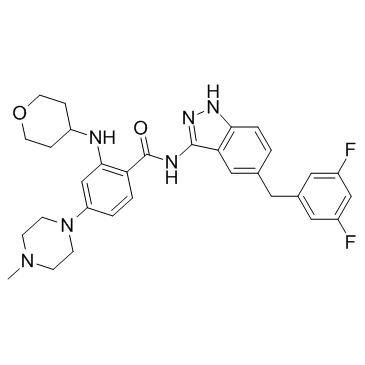Routes of
administration By mouth Legal status Investigational PubChem CID 25141092 Molar mass 560.64 g/mol | ATC code None CAS Number 1108743-60-7 ChemSpider 24808589 | |
 | ||
Entrectinib
Entrectinib (INN, previously known as RXDX-101 and NMS-E628) is an investigational drug with preliminary antitumor activity. It is a selective tyrosine kinase inhibitor (TKI), of the tropomyosin receptor kinases (Trk) A, B and C, C-ros oncogene 1 (ROS1) and anaplastic lymphoma kinase (ALK).
Contents
History
In the U.S., entrectinib has orphan drug designation and rare pediatric disease designation for the treatment of neuroblastoma and orphan drug designation for treatment of TrkA-, TrkB-, TrkC-, ROS1- and ALK-positive non-small cell lung cancer (NSCLC) and metastatic colorectal cancer (mCRC). It has an EU orphan designation for neuroblastoma.
Mechanism of action
The process of tumorigenesis frequently involves protein kinase activation events, which can result from either mutations, or chromosomal rearrangements. Gene rearrangements, leading to the expression of constitutively activated fusion tyrosine kinase receptors, have been increasingly identified as a common feature of malignancies over the last three decades, and success has been demonstrated using these rearrangements as targets for drug development.
The expression of such gene fusions in a tumor can create a phenomenon termed ‘oncogene addiction’ in which the tumor becomes dependent on signaling by the aberrant kinase pathway, thus rendering its survival and continued proliferation exquisitely sensitive to targeted inhibition with small molecule tyrosine kinase inhibitor drugs. Expression of the proteins encoded by these tyrosine kinase fusion genes can, in most cases, be shown to function independently as oncogenic drivers, capable of activating critical downstream pathways involved in the malignant phenotype, resulting in transformation of cells in vitro. Some of the most important kinases that have been shown to undergo rearrangement in human cancers include the anaplastic lymphoma kinase (ALK), ROS1 kinase, and the neurotrophic receptor tyrosine kinases (NTRKs).
Entrectinib is a selective tyrosine kinase inhibitor with specificity, at low nanomolar concentrations, for all of three Trk proteins (encoded by the NTRK1, 2, and 3 genes, respectively) as well as the ROS1, and ALK receptor tyrosine kinases. The drug is orally administered, once daily, and is being studied in patients whose tumors have been shown to have fusions in NTRK1/2/3, ALK, or ROS1. As a ROS1 inhibitor, entrectinib has demonstrated in cellular anti-proliferative studies to have a 36-fold greater potency against ROS1 as compared with another commercially available ROS1 inhibitor, crizotinib.
Entrectinib has also demonstrated in-vitro efficacy against potential Trk inhibitor resistance mutations such as NTRK1 F589L, NTRK1 V573M, NTRK1 G667S.
Clinical development
Entrectinib is currently being tested in a global phase II basket clinical trial called STARTRK-2. Interim results from two ongoing phase 1 trials have been recently reported at the 2016 AACR American Association for Cancer Research Conference in April 2016: among the patients treated with entrectinib, four patients had tumors harboring NTRK fusions, including patients with non-small cell lung cancer (NSCLC), mCRC, salivary gland cancer, and astrocytoma.
The preliminary results seen with entrectinib in the phase I studies of patients with NTRK/ROS1/ALK fusions have led to the initiation of an open-label, multicenter, global, phase II basket study (STARTRK-2) to examine the use of entrectinib in patients having tumors with these gene rearrangements. The study will enroll any patient with a solid tumor having evidence of an NTRK/ROS1/ALK fusion, assuming the patient meets all other entry criteria. Examples of such tumor types include NSCLC, mCRC, salivary gland cancer, sarcoma, melanoma, thyroid cancer, glioblastoma, astrocytoma, cholangiocarcinoma, lymphoma and others.
